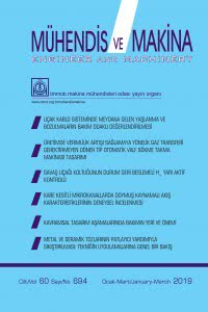SOĞUK DÖVME KALIPLARINDA MEYDANA GELEN KIRILMA SEBEPLERİNİN NÜMERİK OLARAK İNCELENMESİ
Soğuk dövme özellikle yüksek mukavemetli bağlantı elemanları üretiminde kullanılan plastik şekil
verme yöntemlerinden biridir. Dövme işlemi oda sıcaklığında gerçekleştiğinden ılık ve sıcak dövmeye
kıyasla çok daha yüksek dövme yükleri ortaya çıkmaktadır. Bu yükler soğuk dövme kalıplarının beklenenden daha düşük çevrimlerde kırılmasına yol açabilir. Bu çalışmada, orta karbonlu çelik alaşımı
M8 cıvata üretiminde kullanılan ve düşük çevrimlerde kırılan sabit dövme kalıbı üzerinde oluşan
gerilmeler sonlu elemanlar yöntemi kullanılarak belirlenmiş ve kırılma nedenleri incelenmiştir. Soğuk dövme işlemi ile kalıp gerilme analizleri SIMUFACT FORMING sonlu elemanlar programında
gerçekleştirilmiştir. Nümerik simülasyonlar dövme işlemi sırasında kalıp kırılmasına sebep olacak
gerilmelerin oluşmadığını göstermiştir. Çekirdek üzerinde kırılma oluşmaması için çekirdek ve zarf
arasındaki sıkı geçme değerinin 0,5% civarında olması gerektiği belirlenmiştir.
Anahtar Kelimeler:
Soğuk dövme, kalıp analizi, simülasyon
NUMERICAL INVESTIGATION OF FAILURE EVOLUTION ON COLD FORGING DIES
Cold forging is one of the plastic deformation methods that is used to produce high strength fasteners.
Higher forging forces occur during cold forging operations in contrast to warm or hot forging. These
higher forces may cause failure of cold forging dies in low forging cycles. In this study, stress analysis
of cold forging dies which failed in low forging cycles during production of medium carbon steel alloy
M8 bolts was carried out and reasons of the failure evolution were determined. Numerical simulations
of cold forging operation and die stress analysis were conducted by using finite element software
SIMUFACT FORMING. Numerical simulations revealed that stresses occurred on the die during
forging of the bolt were not high enough to cause any failure. It was also determined that interference
fitting value should be close to %0.5 to prevent the fracture on the insert.
Keywords:
Cold forging, die analysis, simulation,
___
- 1. Jeswiet, J., Geiger, M., Engel, U., Kleiner, M., Schikorra, M., Duflou, J., Neugebauer, R., Bariani, P., Bruschi, S. 2008. "Metal forming Progress since 2000," CIRP Journal of Manufacturing Science and Technology, vol. 1, no. 1, p. 2-17.
- 2. Berns, H., Melander, A., Weichert, D., Asnafi, N., Broeckmann, C., Groβ-Weege, A. 1998. "A New Material for Cold Forging Tools," Computational Materials Science, vol. 11, no. 3, p. 166-180.
- 3. Skov-Hansen, P., Bay, N., Grønbæk, J., Brøndsted, P. 1999. "Fatigue in Cold-Forging Dies: Tool Life Analysis 1," Journal of Materials Processing Technology, vol. 95, no. 1–3, p. 40-48.
- 4. Cosenza, C., Fratini, L., Pasta, A., Micari, F. 2004. "Damage and Fracture Study of Cold Extrusion Dies," Engineering Fracture Mechanics, vol. 71, no. 7-8, p. 1021-1033.
- 5. Wagner, K., Putz, A., Engel, U. 2006. "Improvement of Tool Life in Cold Forging by Locally Optimized Surfaces," Journal of Materials Processing Technology, vol. 177, no. 1-3, p. 206- 209.
- 6. Jhavar, S., Paul, C. P., Jain, N. K. 2013. "Causes of Failure and Repairing Options for Dies and Molds: A Review," Engineering Failure Analysis, vol. 34, p. 519-535.
- 7. Lee, H. C., Saroosh, M. A., Song, J. H., Im, Y. T. 2009. "The Effect of Shrink Fitting Ratios on Tool Life in Bolt Forming Processes," Journal of Materials Processing Technology, vol. 209, no. 8, p. 3766-3775.
- 8. Yurtdaş, S., U. İnce, C. Kılıçaslan, Yıldız, H. 2016. "A Case Study for Improving Tool Life In Cold Forging: Carbon Fiber Composite Reinforced Dies," Research on Engineering Structures & Materials, DOI:http://dx.doi.org/10.17515/ resm2016.24me2902, son erişim tarihi:12.07.2016.
- 9. Asnafi, N. 1999. "On Tool Stresses in Cold Heading of Fasteners," Engineering Failure Analysis, vol. 6, no. 5, p. 321-335.
- 10. Ince, U., Güden, M. 2013. "An Iterative Numerical Method for Determination of Temperature-Dependent Friction Coefficients in Thermomechanical Model Analysis of Cold Bolt Forging," The International Journal of Advanced Manufacturing Technology, vol. 68, no. 9, p. 2133-2144.
- ISSN: 1300-3402
- Yayın Aralığı: Yılda 4 Sayı
- Başlangıç: 1957
- Yayıncı: TMMOB MAKİNA MÜHENDİSLERİ ODASI
Sayıdaki Diğer Makaleler
SOĞUK DÖVME KALIPLARINDA MEYDANA GELEN KIRILMA SEBEPLERİNİN NÜMERİK OLARAK İNCELENMESİ
TÜRKİYE’DE HAVACILIK ENDÜSTRİSİNDE BAKIM TEKNİSYENİ YETİŞTİRME PATİKASI
KAYNAK CIVATA VE SOMUNLARININ ÇEŞİTLERİ, ÜRETİMİ, YÖNTEMİ VE KULLANIM ALANLARI
Deniz ÇOBAN ÖZKAN, Bekir Sadık ÜNLÜ
TERMOPLASTİK PARÇA ÜRETİMİNDE MİKROHÜCRESEL KÖPÜK TEKNOLOJİSİNİN KULLANIMI
